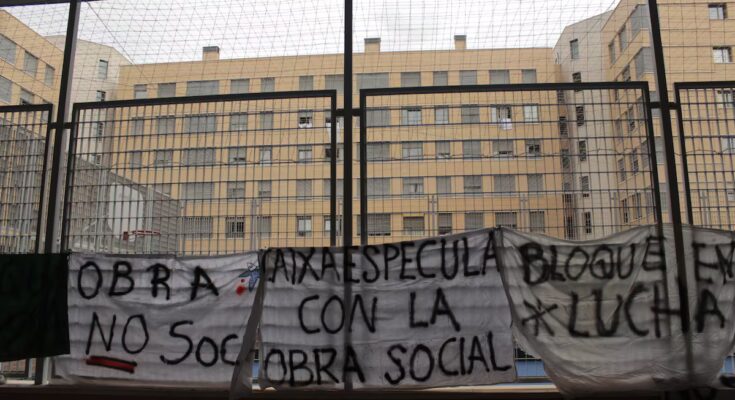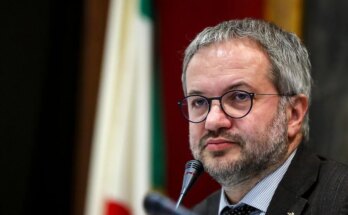Two new social housing developments moving to the free market. More than a hundred neighbors who once had the security of affordable shelter were soon at risk of homelessness. The tenants of two condominiums located in the Ensanche de Vallecas neighborhood, in the Villa de Vallecas neighborhood, gathered to denounce the “silent” eviction operation that they began to experiment with – as Cadena SER reported and this newspaper confirmed – after the la Caixa Foundation sold these properties to an investment fund which were intended for social rents of between 400 and 600 euros.
The recipe is not new. “It’s about expelling us at the expense of speculation,” says David Jiménez, a 55-year-old neighbor who has lived in one of the apartments in these blocks for 18 years. David moved in 2007 with his seven-year-old son, soon after the Obra Social de la Caixa program inaugurated these two settlements in Vallecas, located in Mazaterón 8-10 and Fresno de Cantespino 1-3, to provide housing for under 35s and over 65s with difficulty accessing housing.
“To obtain one of the apartments you had to meet certain requirements, have a maximum income,” explains David, who currently pays around 400 euros for his apartment and who suffers from a heart disease for which he was recognized as 49% disabled. Little by little, neighbors like him arrived at the 220 identical apartments that these two blocks have: 45 square meters, one room, economical materials and a functional design. «The Foundation had never put us in difficulty with the renewal of contracts», he comments.
Until 2022 they began to refuse to do so with those who were losing. “This had been happening for a long time, but they were invisible evictions because the other neighbors didn’t know who was leaving because the contract hadn’t been extended,” explains María Díaz, another of the affected neighbors. The situation began to become sensational when in August this year all the neighbors received a letter signed by InmoCaixa, the real estate agency that managed the apartments, to inform them that they would not renew the expired contracts from that moment on. They gave no explanation, no details.
A spokesperson for the Foundation responds: “It is a work whose VPO term had expired and, therefore, had passed to the free market. Tenants are always informed in a timely manner and always respecting the conditions of the contracts that both parties have signed.” It adds that although they have worked for decades to facilitate access to housing for vulnerable groups, in recent years they have “refocused their lines of strategic action, focusing efforts on social programs” such as employment, child poverty, support for the elderly or care for people with advanced illnesses.
A new letter
In October, the neighbors began receiving another letter, in this case from the company to which the Foundation sold the apartments, Mosaic Propco SLU, informing them that the contracts are now up to it. With this news, the neighbors have even less hope of being able to renew and many of them believe that what the Foundation has done is to subrogate the contracts to another company so as not to bring the bad image of having broken that commitment to the house.
The Platform for People Affected by Mortgages (PAH) has joined these tenants in their fight: “After receiving subsidies and deductions to build the Welfare Project, Caixabank now continues to try to increase its profits through speculation by selling it. While using its fight for poverty or for children through its foundation as an image wash, it threatens to evict hundreds of families with minors, elderly people and people with few resources.”
Neighbors estimate that there are around 110 who still have contracts from the InmoCaixa days. At least four of them have “housing emergencies” and another 40 will expire in the coming months. David is among the first, given that his contract was one of the “silent” ones that expired in 2022 and he was denied an extension. His case, he says, reached the court, which initially ruled in his favour, finding that the Foundation had acted in bad faith by not extending it, but that resolution was challenged and is still ongoing. “I continue to pay rent and bills every month. They never gave me any receipts or said anything else, it’s a strange situation,” says the neighbor, who fears that because of his situation he will be the next to be permanently expelled.
María’s contract expires in April 2026, when she will have lived in that apartment for 12 years, but she says there are people who have been there even longer and who have been made false promises. “There is an entire floor, the first, intended for the elderly and they were sold to them who would never leave until they wanted to,” he clarifies.
According to what the Foundation informs this newspaper, in cases where there is proven vulnerability “we always act hand in hand and in coordination with the Administration to look for residential alternatives”, but the neighbors assure that so far none of these have been given a solution.
“It seems strange to us that if the apartments no longer belong to the Foundation, they continue to say that they will offer us an alternative. This only reinforces the idea that the new owner is a front company to hide speculation,” says David. Neighbors report that in both buildings there are already houses for seasonal rent costing around 1,100 euros, two or three times what a social rental costs. They are also struck by the fact that there are some for sale for values around 250,000 euros, despite the fact that they are “very modest houses without parking”.
“Unfortunately this situation is not new because in Madrid, where Almeida governs, urban planning is at the service of speculators,” complains Eduardo Rubiño, councilor of Más Madrid. “The mayor works for a city for the rich, for tourists, but he is not interested in the housing emergency that the workers suffer from”.
Más Madrid met with neighbors and agreed to bring this Tuesday to the plenary session of Villa de Vallecas a proposal in which he will urge the Municipal Construction and Land Company of Madrid (EMVS) to negotiate with the current owners to acquire these houses and include them in the public heritage for affordable rental. They will also call for the eviction of neighbors whose contracts are terminated to stop during the operation and for the District Council’s social services to look after those in vulnerable situations.



